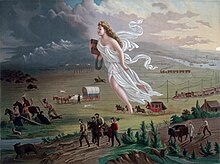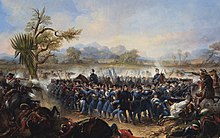 Global Information
Global InformationManifest destiny information


| History of U.S. expansion and influence |
|---|
|
Manifest destiny was a phrase in the 19th-century United States that represented the belief that American settlers were destined to expand westward across North America, and that this belief was both obvious ("manifest") and certain ("destiny"). The belief was rooted in American exceptionalism and Romantic nationalism, implying the inevitable spread of the Republican form of governance.[2] It was one of the earliest expressions of American imperialism in the United States of America.[3][4][5]
According to historian William Earl Weeks, there were three basic tenets behind the concept:[2]
- The assumption of the unique moral virtue of the United States.
- The assertion of its mission to redeem the world by the spread of republican government and more generally the "American way of life."
- The faith in the nation's divinely ordained destiny to succeed in this mission.
Manifest destiny remained heavily divisive in politics, causing constant conflict with regards to slavery in these new states and territories.[6] It is also associated with the settler-colonial displacement of Indigenous Americans[7] and the annexation of lands to the west of the United States borders at the time on the continent. The concept became one of several major campaign issues during the 1844 presidential election, where the Democratic Party won and the phrase "Manifest Destiny" was coined within a year.[3][8] The concept was used by Democrats to justify the 1846 Oregon boundary dispute and the 1845 annexation of Texas as a slave state, culminating in the 1846 Mexican–American War. In contrast, the large majority of Whigs and prominent Republicans (such as Abraham Lincoln and Ulysses S. Grant) rejected the concept and campaigned against these actions.[9][10][11] By 1843, former U.S. President John Quincy Adams, originally a major supporter of the concept underlying manifest destiny, had changed his mind and repudiated expansionism because it meant the expansion of slavery in Texas.[3] Ulysses S. Grant served in and condemned the Mexican–American War, declaring it "one of the most unjust ever waged by a stronger against a weaker nation".[10] Historian Daniel Walker Howe summarizes that "American imperialism did not represent an American consensus; it provoked bitter dissent within the national polity".[3][12]
- ^ "John Gast, American Progress, 1872". Picturing U.S. History. City University of New York. Archived from the original on June 15, 2014. Archived June 15, 2014, at the Wayback Machine
- ^ a b Weeks, William Earl (2002). John Quincy Adams and American Global Empire. University Press of Kentucky. pp. 183–184. ISBN 978-0-8131-9058-7.
- ^ a b c d Merk 1963, pp. 215–216
- ^ Byrnes, Mark Eaton (2001). James K. Polk: A Biographical Companion (illustrated ed.). ABC-CLIO. p. 128. ISBN 978-1576070567.
- ^ "America's Manifest Destiny | The American Experience in the Classroom". Retrieved April 10, 2024.
- ^ Cite error: The named reference
supportwas invoked but never defined (see the help page). - ^ Dahl, Adam (2018). Empire of the People: Settler Colonialism and the Foundations of Modern Democratic Thought. University Press of Kansas. pp. 101–26. doi:10.2307/j.ctt22rbjjz.8.
- ^ Cite error: The named reference
coinedwas invoked but never defined (see the help page). - ^ Greenberg, Amy S. (2013). A Wicked War: Polk, Clay, Lincoln, and the 1846 U.S. Invasion of Mexico. Vintage Books. p. 51. ISBN 978-0307475992.
- ^ a b Simpson, Brooks (2014). Ulysses S. Grant: Triumph Over Adversity, 1822–1865. Voyageur Press. p. 30. ISBN 978-0760346969.
- ^ Joy, Mark (2014). American Expansionism, 1783–1860: A Manifest Destiny?. Routledge. pp. 62, 70. ISBN 978-1317878452.
- ^ Howe, D.W. (2007). What Hath God Wrought: The Transformation of America, 1815–1848. Oxford History of the United States. Oxford University Press. p. 705. ISBN 978-0-19-972657-8.